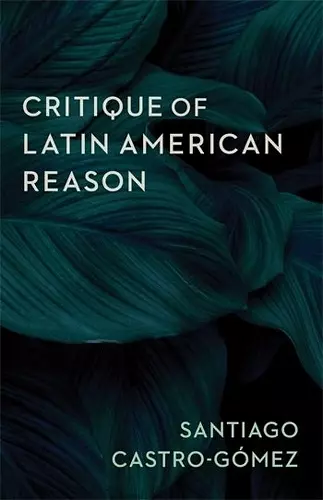Critique of Latin American Reason
Santiago Castro-Gómez author Andrew Ascherl translator Eduardo Mendieta editor
Format:Hardback
Publisher:Columbia University Press
Published:29th Oct '21
Currently unavailable, and unfortunately no date known when it will be back

Critique of Latin American Reason is one of the most important philosophical texts to have come out of South America in recent decades. First published in 1996, it offers a sweeping critique of the foundational schools of thought in Latin American philosophy and critical theory.
Santiago Castro-Gómez argues that “Latin America” is not so much a geographical entity, a culture, or a place, but rather an object of knowledge produced by a family of discourses in the humanities that are inseparably linked to colonial power relationships. Using the archaeological and genealogical methods of Michel Foucault, he analyzes the political, literary, and philosophical discourses and modes of power that have contributed to the making of “Latin America.” Castro-Gómez examines the views of a wide range of Latin American thinkers on modernity, postmodernity, identity, colonial history, and literature, also considering how these questions have intersected with popular culture. His critique spans Central and South America, and it also implicates broader and protracted global processes.
This book presents this groundbreaking work of contemporary critical theory in English translation for the first time. It features a foreword by Linda Martín Alcoff, a new preface by the author, and an introduction by Eduardo Mendieta situating Castro-Gómez’s thought in the context of critical theory in Latin America and the Global South. Two appendixes feature an interview with Castro-Gómez that sheds light on the book’s composition and short provocations responding to each chapter from a multidisciplinary forum of contemporary scholars who resituate the work within a range of perspectives including feminist, Francophone African, and decolonial Black political thought.
Critique of Latin American Reason is one of the pivotal texts in Latin American studies and an obligatory reference for anyone who is interested in approaching critical thinking in the context of the global south. It has changed the conversation about how to do history of ideas in Latin America from a renewed and very timely approach to genealogy and what Castro-Gómez calls, with Foucault, an ontology of the present. If the field of philosophy can recognize that it is in need of a serious critique of its colonial methodologies, this book will be at the center of that undertaking. -- María del Rosario Acosta López, Professor of Latin American Studies, University of California, Riverside
Castro-Gómez is one of the very few thinkers from Latin America who has crossed over into philosophy in Europe and the U.S., though, until now, a lack of translation has negatively impacted the recognition of his importance. Critique of Latin American Reason is an ambitious archaeological reconstruction of the idea of a separate, unique, authentic form of thinking that would be characteristic of the region in opposition to the imperial and colonial forces. This is a book that is only more urgent today than when originally published. -- Bruno Bosteels, author of Marx and Freud in Latin America: Politics, Psychoanalysis, and Religion in Times of Terror
Critique of Latin American Reason is by now required reading in Latin American thought. In this foundational work, Santiago Castro-Gómez rethinks Latin American philosophy through philosophical reflection combined with the empirical methods of the social sciences. While critically undoing the essentialist and colonizing myths that underlie the last hundred years of Latin American philosophy, the book exposes Latin American reality as a neuralgic dynamic space of power, a reality configured by the incessant raging of globalization with its project of infinite progress and domination of life. Ultimately, Castro-Gómez's critique makes a major contribution to liberatory thought in and beyond Latin America. -- Alejandro Vallega, author of Latin American Philosophy from Identity to Radical Exteriority
This long overdue translation of Santiago Castro-Gómez's groundbreaking Crítica de la razón latinoamericana is timely. Despite being a record of debates very much of its time, twenty-five years past, the book provides invaluable insights and methodological approximations for our troubled times. A Foucauldian genealogy guides the book’s critical exposition of the construction of 'Latin America,' which Castro-Gómez considers a colonial motif of Othering during the twentieth century by Latin American intellectuals. This exoticization posits an epistemic exteriority that more than homogenizes the complexity of that object—'Latin America.' It recenters an elite through discursive practices that establish it as located 'outside of' and 'antagonistic' to modernity. Readers today might find the specific debates and their framing in need of update. Look again and find here important precursors to and critical keys for engaging the coloniality of power in knowledge production; contemporary pressures on the categories of 'Latin American,' 'Latinidad,' and 'Latinx'; the complexities of the racial order that defines the afterlife of colonialism in the region. Indeed, Crítica is the first installment in what Castro-Gómez considers a trilogy that, along with La hybris del punto cero (2005: Zero-Point Hubris: Science, Race, and Enlightenment in New Granada (1750–1816 (forthcoming) and Tejidos oníricos (2009), provides a Foucauldian genealogy 'to rethink the colonial inheritances of Latin America.' Containing a preface by Castro-Gómez written for this superb Andrew Scherl translation, a forward by Linda Martín Alcoff, an introduction by Eduardo Mendieta, the appendix to the second edition of the Spanish original (an interview with Castro-Gómez conducted by Alejandro Cortés), and a new appendix with provocations by Yuderkys Espinosa Miñoso, Nadia Yala Kisukidi, Don Deere, Barnor Hesse, Cintia Martínez Velasco, María del Rosario Acosta López, Jesús Luzardo, Jimmy Casas Klausen, Rafael Vizcaíno, and myself, this volume is essential reading for any engagement with Latin American thought. -- Rocío Zambrana, author of Colonial Debts: The Case of Puerto Rico
ISBN: 9780231200066
Dimensions: unknown
Weight: unknown
352 pages